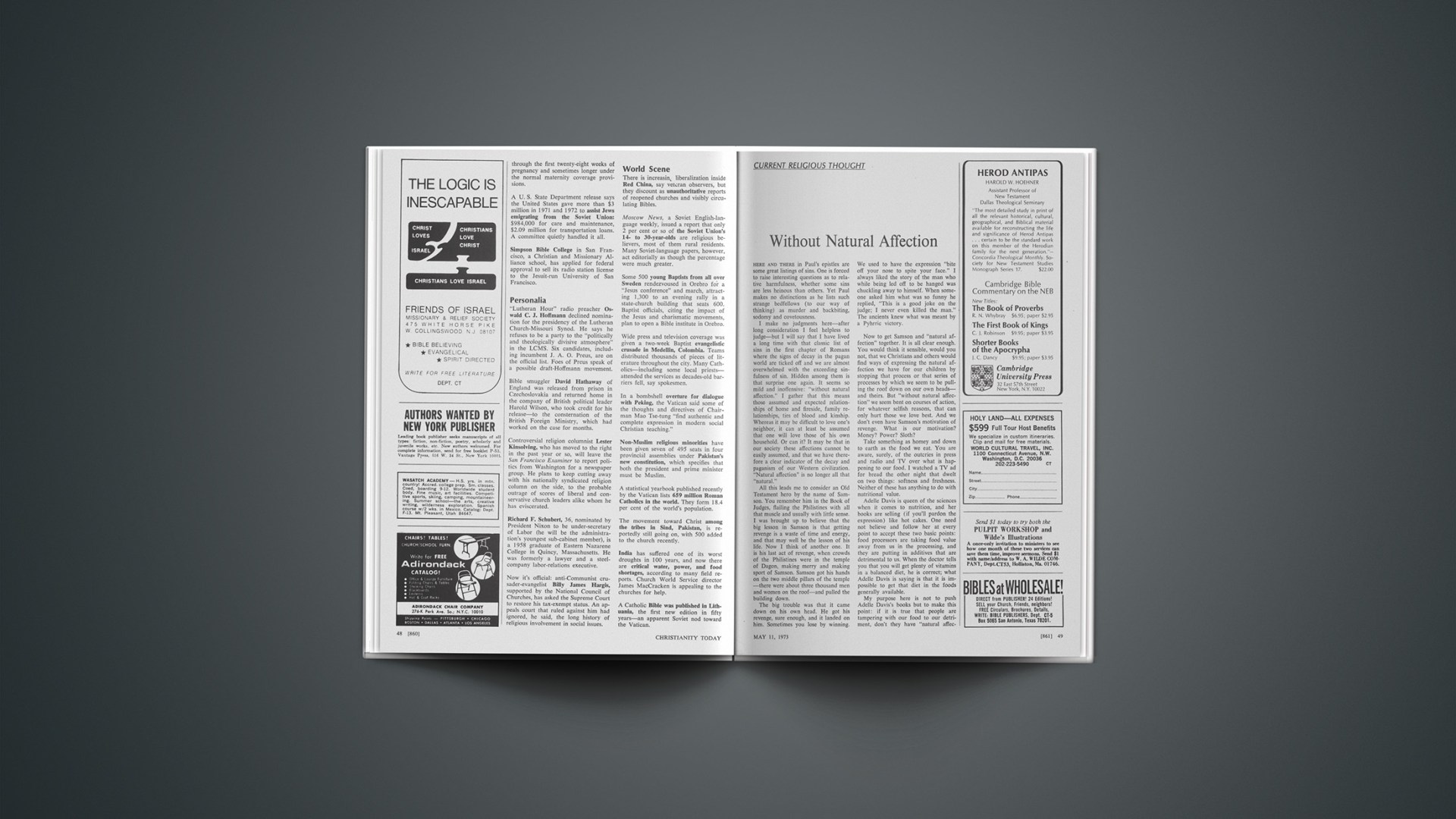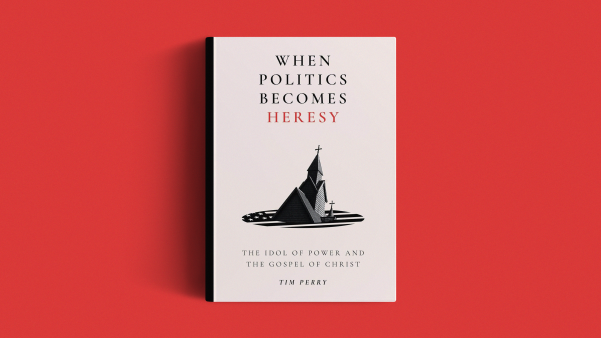Here and there in Paul’s epistles are some great listings of sins. One is forced to raise interesting questions as to relative harmfulness, whether some sins are less heinous than others. Yet Paul makes no distinctions as he lists such strange bedfellows (to our way of thinking) as murder and backbiting, sodomy and covetousness.
I make no judgments here—after long consideration I feel helpless to judge—but I will say that I have lived a long time with that classic list of sins in the first chapter of Romans where the signs of decay in the pagan world are ticked off and we are almost overwhelmed with the exceeding sinfulness of sin. Hidden among them is that surprise one again. It seems so mild and inoffensive: “without natural affection.” I gather that this means those assumed and expected relationships of home and fireside, family relationships, ties of blood and kinship. Whereas it may be difficult to love one’s neighbor, it can at least be assumed that one will love those of his own household. Or can it? It may be that in our society these affections cannot be easily assumed, and that we have therefore a clear indicator of the decay and paganism of our Western civilization. “Natural affection” is no longer all that “natural.”
All this leads me to consider an Old Testament hero by the name of Samson. You remember him in the Book of Judges, flailing the Philistines with all that muscle and usually with little sense. I was brought up to believe that the big lesson in Samson is that getting revenge is a waste of time and energy, and that may well be the lesson of his life. Now I think of another one. It is his last act of revenge, when crowds of the Philistines were in the temple of Dagon, making merry and making sport of Samson. Samson got his hands on the two middle pillars of the temple—there were about three thousand men and women on the roof—and pulled the building down.
The big trouble was that it came down on his own head. He got his revenge, sure enough, and it landed on him. Sometimes you lose by winning.
We used to have the expression “bite off your nose to spite your face.” I always liked the story of the man who while being led off to be hanged was chuckling away to himself. When someone asked him what was so funny he replied, “This is a good joke on the judge; I never even killed the man.” The ancients knew what was meant by a Pyhrric victory.
Now to get Samson and “natural affection” together. It is all clear enough. You would think it sensible, would you not, that we Christians and others would find ways of expressing the natural affection we have for our children by stopping that process or that series of processes by which we seem to be pulling the roof down on our own heads—and theirs. But “without natural affection” we seem bent on courses of action, for whatever selfish reasons, that can only hurt those we love best. And we don’t even have Samson’s motivation of revenge. What is our motivation? Money? Power? Sloth?
Take something as homey and down to earth as the food we eat. You are aware, surely, of the outcries in press and radio and TV over what is happening to our food. I watched a TV ad for bread the other night that dwelt on two things: softness and freshness. Neither of these has anything to do with nutritional value.
Adelle Davis is queen of the sciences when it comes to nutrition, and her books are selling (if you’ll pardon the expression) like hot cakes. One need not believe and follow her at every point to accept these two basic points: food processors are taking food value away from us in the processing, and they are putting in additives that are detrimental to us. When the doctor tells you that you will get plenty of vitamins in a balanced diet, he is correct; what Adelle Davis is saying is that it is impossible to get that diet in the foods generally available.
My purpose here is not to push Adelle Davis’s books but to make this point: if it is true that people are tampering with our food to our detriment, don’t they have “natural affection”? Don’t they suspect that their own children can be inheritors of the diseases attendant on poor nutrition? And what about natural affection toward their fellow citizens? Are they pulling the roof down on themselves in their show of strength or pursuit of profits?
There are supposed to be twelve million new cars on the roads in the United States in 1973. Is there no end to this? And where will these cars all end up anyway? Are the junk heaps big enough to contain them? Don’t be fooled by a little publicity here and there about high schoolers engaging in recycling schemes. That’s sentimental eyewash. And the efforts to reduce the poisons coming out of our cars are being threatened by cries of crippling the auto industry or of widespread unemployment. We are being frightened away from reform.
Plastics go along with this sort of thing. Plastics will never return to the soil; biologically they can’t do it—ever! And all that wheat we ship all over the world will never come back in anything but money; the topsoil represented by a shipload of wheat is gone forever. In expending our marvelous efforts, do we keep pulling the building down on our own heads—and on those bound to us by natural affection?
A good many years ago I sat in a service club meeting listening to efforts by a committee to stir up ways of getting more industry into our town. Industry brings new payrolls, increases the circulation of money, sells real estate, makes more people rich. To what end? So that those who have made money out of the industry can go to some other place that has not taken on new industry and is therefore worth going to. The old home town is now a place to get away from. One man at the same club defended strip mining: “You can have money or scenery but you can’t have both; make money here and go to Canada for your scenery.”
Where is Christianity in all this? Try unselfishness for a starter. A government that is the choice of the governed requires that everyone give up some freedom in order to enjoy freedom at all—the basketball referee principle. Business expansion has controls but will need more controls. In Christian terms this could and ought to mean self-controls. There are places for cross-bearing, losing once in a while in order to win, not always being the biggest, and so on. The GNP is not God; it sounds more like the service of mammon, and unless God keep, the watchman will cry in vain. If this acceleration keeps us, we will all be permanently residually inert. And that’s no way to treat the kids.










